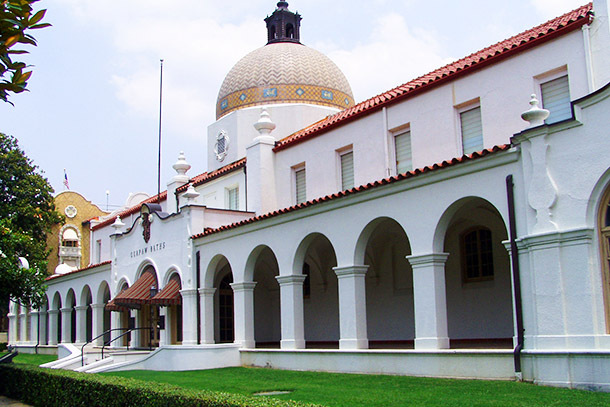
It’s time to celebrate! This year marks the 100th anniversary of the National Parks Service, and we’re honoring the centennial by featuring one great park perfect for every month. As a bonus, we’ll also give you the scoop on a less-known park that’s perfectly in-season.
Why Hot Springs National Park Is Amazing
This unique park in Arkansas holds two distinctions: First, at 5,549 acres, it’s the smallest of the country’s 59 national parks. Secondly, while Yellowstone was the first to be designated specifically as a public park in 1872, Hot Springs was so valued for its mineral-rich natural springs (both hot and cold) that President Andrew Jackson proclaimed the area a federal “reserve” in 1832—marking the federal government’s first attempt to aside land for all to enjoy—in effect, making Hot Springs the original national park.
Unlike the vast national parks of the West, where the undeveloped scenery takes center stage, Hot Springs—the 15th most-visited national park in the country—is an urban park that’s most popular for its spa-like setting. The destination was developed in the 19th century after entrepreneurs recognized the potential in the more than 40 natural hot springs escaping Hot Springs Mountain. Bathhouse Row, a National Historic Landmark District, showcases eight buildings completed in the early 20th century, whose Gilded-Age opulence has been preserved, though only two are still used for bathing.
If you don’t intend to bathe in it, you can still “take waters”—by drinking it right out of the fountain. The park vouches for the safety of the water, and in fact encourages you to drink it by maintaining six “jug fountains,” four hot water and two cold, where you can fill up and take some home with you.
And if you want to slip away from city life for a bit, there are also 26 miles of hiking trails, and first-come, first-served camping at Golpha Gorge Campground. Or drive to the end of Hot Springs Mountain Drive then ascend to the top of the 216-foot Hot Springs Mountain Tower for unobstructed, panoramic views of the Ouachita Mountains.
Why March Is the Perfect Time to Go
With temperatures comfortable and mild—mostly in the 60s and low 70s—March is a great time to catch the park before summer heat and humidity descends.
Why It’s Great at Other Time of Year
Hot Springs National Park can be enjoyed pretty much year-round, even when it’s raining. October and November are two of the most popular months because of the fall colors in the mountains and the generally good weather.
If You Go, Don’t Miss
It would be a shame to visit and not avail yourself of what people have been gathering for in this valley for thousands of years, beginning with the Native American tribes who held it sacred: bathing in waters that come out of the ground around 143 degrees Fahrenheit. Buckstaff is the only bath house on the row that’s been in continuous operation since it opened, in 1912. “Non-pretentious” would be a good description of the first-come, first-served services offered at Buckstaff, which is more like a no-frills Turkish hammam than a spa. For a more luxurious day-spa experience, book a treatment at the Quapaw Baths & Spa.
Or, follow the Hot Springs Historic Baseball Trail, which documents Hot Springs’ title as the Birthplace of Spring Baseball. From 1886 through the 1940s, a number of professional baseball teams and players began training in Hot Springs because of its good weather and therapeutic baths (in 1918, Babe Ruth hit the first 500-plus home run here). Self-guided tours are easy using the downloadable app, scanning a QR code, or making a phone call.
March Bonus Pick: Hawaii Volcanoes
As winter drags on, who couldn’t use a little tropical getaway? The beaches may beckon, but The Big Island’s marquee attractions are two of the Earth’s most active volcanoes, Mauna Loa and Kilaua, where lava has been intermittently sliding seaward since 1983, augmenting the island’s land mass by about 500 acres. (Hualalai volcano also is classified as active, but it hasn’t erupted since 1801.) In 2008, a new vent erupted in the Kilaua caldera and the Halema’uma’u Crater, forming a glowing-red lava lake that’s become one of the park’s most popular features. Don’t miss the Crater Rim Drive for spectacular views of the crater; if conditions permit, turn off on the Chain of Craters Road and follow it down to where the cooled lava meets the Pacific Ocean.
More from SmarterTravel:
- Everglades: Our January National Park of the Month
- Death Valley: Our February National Park of the Month
- 10 National Parks You Never Knew Existed
Deb Hopewell is a longtime journalist and the former editor of Yahoo Travel. She writes for Outside, Fodor’s, Architectural Digest, Travel+Leisure, Yahoo Travel, and others. Follow her on Instagram @debhopewell and Twitter @dhopewell.
(Photo: Wikimedia Commons via CC Attribution/Share Alike)
We hand-pick everything we recommend and select items through testing and reviews. Some products are sent to us free of charge with no incentive to offer a favorable review. We offer our unbiased opinions and do not accept compensation to review products. All items are in stock and prices are accurate at the time of publication. If you buy something through our links, we may earn a commission.
Related
Top Fares From
Today's Top Travel Deals
Brought to you by ShermansTravel
Greece: 9-Night Vacation, Incl. Meteora &...
Exoticca
 vacation
$2099+
vacation
$2099+
New Year Sale: Luxe, 9-Nt Alaska...
Oceania Cruises
 cruise
$3599+
cruise
$3599+
Ohio: Daily Car Rentals from Cincinnati
85OFF.com
 Car Rental
$19+
Car Rental
$19+



